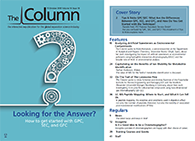Waters Opens Food and Water Centre in Singapore
Waters Corporation has opened a new International Food and Water Research Centre (IFWRC) in Singapore to address the growing challenges of food and water security and safety.
Waters Corporation (Milford, Massachusetts, USA) has opened a new International Food and Water Research Centre (IFWRC) in Singapore to address the growing challenges of food and water security and safety. The centre will be led by a Scientific Advisory Panel that will identify meaningful, innovative projects by working with academic and industrial leaders.
“In past decades, Singapore has become a major hub for food and water research that has far-reaching impacts around the globe. The country has long had well-established academic laboratories where scientists have done significant work,” said Mike Harrington, Senior Vice President of Global Markets at Waters
“Based on that, along with Waters’ storied history in Singapore, we are thrilled to open the IFWRC, a model for scientific collaboration between industry, government, and academia that will ultimately drive significant advances in food and water quality,” continued Harrington.
Important research areas such as food fraud discovery, water contamination research, food quality enhancement, and new ingredient and formulation studies will be prioritized as the research centre seeks to find solutions to food and water supply challenges around the world.
Researchers will gain access to IFWRC’s state-of-the-art facilities outfitted with analytical instrumentation from Waters. In addition, the laboratory will be staffed with scientists and researchers who will work closely with project owners throughout implementation.
For more information, please visit www.waters.com

Analysis of PFAS in Milk by LC-MS/MS
May 15th 2025Dairy milk is one commodity that can be impacted by environmental contaminants, such as PFAS, so it is important to implement extensive, robust, and accurate testing. In this work, a sensitive and reliable method was developed for the analysis of PFAS in milk by LC-MS/MS at levels as low as 0.01 µg/kg.

.png&w=3840&q=75)

.png&w=3840&q=75)



.png&w=3840&q=75)



.png&w=3840&q=75)













